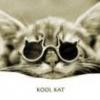
Veganstvo, vegetarijanstvo, presnojedstvo
#81

Posted 10 June 2008 - 09:01 AM
Povsod je potrebna neka zmernost, ne zdaj, da se greš mesojedca do te mere da maš v 3 obrokih dnevno meso in se čudiš ko te fršlok. Niti, da se greš nekega presnojedca in žvečih "travo" do te mere, da se ti skisa.
#82

Posted 10 June 2008 - 09:04 AM
Many faces of vegan - mal za hec, mal zares
By Laura Bruno
VAY-gun, veggin', veg*n, VEE-gin: no matter how people say it, there's more variety than they think. Most long term vegans swear they eat a wider selection of food than they did prior to excluding animal products. Often mystifying cashiers with my produce items, I can personally confirm this experience! As vegans, we've all heard the question, "But, what do you eat?" usually followed by one or more of the following: "Rabbit food?" "You must be one of those health nuts" "Where do you get your protein?" "Are you one of those spray-painting animal rights activists?" "Seriously, what do you eat?" The answer depends on whom they ask. Vegan diets and lifestyles reach as far and wide as the individuals embracing them, with every combination imaginable. You'll find below some of the most common faces of vegan.
The Animal Lover: Who doesn't love animals? I'd venture to say that at least 80% of all vegans hold compassion for non-human friends as the major reason for eschewing meat, dairy, fish, eggs, honey and leather. Somewhere along the way they asked, "If I wouldn't eat my dog, then how can I eat or wear a pig?" Or cow? Or goose? They stopped drawing a line between "their" pet and other creatures. They realized that they love all animals and they invited this love into all aspects of life. They might adopt stray kitties, rescue animals from the pound, volunteer at Farm Sanctuary, become veterinarians, or find deep connections with animals in the wild. Famous animal lovers include: Albert Einstein, Thomas Edison, and Jennifer McCann (The Vegan Lunchbox).
Animal Rights Activists: These people love animals, but they demonstrate that love through more aggressive, public action. They write letters to editors and representatives, picket restaurants that buy factory farmed animals, and expose pharmaceutical companies that engage in torturous animal testing. Some activists risk imprisonment for illegally infiltrating labs and farms, so they can film shocking footage later distributed by groups like People for the Ethical Treatment of Animals (PETA). Others use celebrity status to garner attention. And yes, some activists do spray red paint on fur coats in order to remind wearers of unnecessary bloodshed in the name of fashion. Famous animal rights activists include: Alicia Silverstone, Pamela Anderson, Leonardo da Vinci, Pythagoras, Abraham Lincoln, and George Bernard Shaw.
Environmentalists: The term tree-hugger isn't so far off: economists estimate that one extra acre of trees survives each year when someone embraces a vegan diet. "Food grown directly for human consumption occupies 60 million acres. Food grown to feed livestock occupies 1.2 billion acres." "It takes 16 pounds of grain and 2,500 gallons of water to produce 1 pound of meat. Yet 16 people can be fed on the grain it takes to produce that pound of meat. Growing that amount of grain requires only 250 gallons of water. Countries such as Ethiopia and some Central American countries use their farmland to supply the United States with cheap burgers instead of growing healthful grain foods for their own starving people. Every 2 seconds, a child starves to death somewhere in the world" (Robertson, Robin. Vegan Planet, The Harvard Common Press: 2003, p. 98). These and other statistics urge conservationists to follow a strict vegetarian diet. The most famous environmentalist vegan is John Robbins, author of Diet for a Small America.
The Health Nut: OK, some stereotypes offer a tiny whole grain of truth! This group loves how vegan food makes them look and/or feel. Nutritionally, they recognize the superiority of plant protein, and they get all the protein they need, thank you very much. They might follow a particular diet like Raw Foods or Macrobiotics (featured later), or they might just veganize whatever trendy diet hits the mainstream. I've actually read food diaries from vegan South Beach-ers, and I've seen smoothie directions to stay in the vegan "Zone." Think strong. Think energetic. Think beautiful. Think extra special ordering. Famous health nuts include: Robert Cheeke (a.k.a. "the world's most recognized vegan body builder"), Marie Oser (VegTV), Woody Harrelson, and Tracy Bingham (Baywatch).
Hipster Vegans: These folks are cool. They have that certain something that screams for attention-"in your face" like activists, but in a scene-stealing kind of way. The punk community features a lot of hipster vegans, as does Hollywood. Just because these chaps and gals got style, don't mean they ain't serious. They just know how to push the envelope in creative ways, wearing hairstyles or tattoos that demand a conversation, T-shirts emblazoned with "Beef: It's what's rotting in your colon," creating lasting artwork or screenplays, or hosting a "Fashion with Compassion" lingerie show. In the hipster hall of fame: The Vegan Vixens, Pink, and of course, Herbivore Magazine's "coolest vegan alive," Sarah Kramer.
Junk Food Vegans: Fruit Loops, Jolly Ranchers and Kool-Aid are vegan! So are Frito's, Sweet Tarts, and Duncan Hine's California Walnut Brownie mix. Keebler Vienna Fingers, Crisco, and Cocoa Puffs: yep, all vegan. Hey, folks, the saying "I don't love animals. I just really hate vegetables!" is supposed to be tongue-in-cheek. No hall of shame here: animals appreciate your effort, but a little kale won't kill you. Honest.
Macrobiotics: Made popular in the 1970's by Michio Kushi, macrobiotics draws upon ancient principles regarding the "yin" (expansive) or "yang" (contracting) energy of foods. The word "macrobiotic" means "big life"-the idea of creating a full, radiant life by balancing extremes. Whole grains, especially brown rice, play a starring role in the macrobiotic diet because they rest near the middle of a yin-yang continuum. Other must-haves include sea vegetables, umeboshi plums, miso soup, greens, tempeh and vegetables. Considered an extremely strict diet, macrobiotics does allow room for occasional "cheating." Some macrobiotic followers eat a little meat, fish, dairy or refined sugar, but the overall diet focuses on unprocessed, low-glycemic vegan foods with balanced energies and tastes. Gwyneth Paltrow and Christina Pirello are two macrobiotic celebrities.
Raw Fooders: Sometimes considered the strictest vegan expression, a Raw Foods Diet isn't always vegan. (Some followers consume raw fish, dairy, meat and eggs.) For the most part, though, Raw Fooders eat raw, sprouted, fermented and/or dehydrated plant-based foods. Proponents cite living enzymes and lack of the toxins produced by 105 degree-plus cooking as the secret to raw foods' healing power. Superfoods like raw cacao, spirulina, wheat grass juice, maca and goji berries find their way into smoothies, raw cakes, and dehydrated treats. Famous followers like David Wolfe, Shazzie and the Boutenko's (a.k.a. Raw Family) report vastly increased energy, cure of diseases, clearer thinking, weight loss and a fountain of youth effect. Although most vegans consume some raw food, Raw Fooders generally receive 80-100% of their calories from uncooked foods.
Spiritually Motivated Vegans: Following "a vegetarian diet for spiritual reasons," conjures images of Eastern traditions like Buddhism or Hinduism, with their emphasis on purity of mind, body, and spirit. Indeed, the first mock meats were created in Buddhist kitchens to support monks who had vowed ahimsa (non-harm) yet missed former diets of meat and fish. But other religions support veganism, too. A growing number of Christians interpret the phrase "Stewards of the Earth" as a call to environmental responsibility and non-cruelty to all of Earth's creatures. Salt Lake City offers a surprisingly vegan dining scene due to the many Mormons (Church of Latter Day Saints) believing no one ate meat in Eden. I know Jews who honor the original humane intent of kosher laws by celebrating Seder with a "Passover Yam." Healers, "psychics," and yoga and meditation instructors often find enhanced clarity by adopting a cleaner and more compassionate vegan lifestyle. Famous spiritually motivated vegans include David Life and Sharon Gannon (founders of Jivamukti Yoga School) and Erin Pavlina (former editor of VegFamily).
So, with all this diversity, what exactly does vegan mean? At the first Vegan Society Meeting on November 1, 1944, South Yorkshire's Donald Watson coined the term "vegan" and observed it was "the beginning and end of vegetarian." If you write a paragraph, keeping the initial and final letters of each word and scrambling everything in between, readers can still understand the message. Ancient Greeks referred to this phenomenon as the "alpha and omega," meaning the beginning and the end: that which makes sense of everything in between. Veganism takes vegetarianism to its logical conclusion. If we want to show compassion for animals, then let's avoid all forms of animal cruelty-including factory farms, animal testing, animal skinning and commercial bee hives. If we want lower cholesterol, then let's eat a cholesterol-free diet. If eating lower on the food chain can save this planet, then let's follow a completely plant-based diet. The many faces of vegan offer hope for a future in which we can all smile.
Laura Bruno is a Life Coach, Medical Intuitive and Reiki Master Teacher from Sedona, Arizona. In addition to private coaching and intuitive sessions, she teaches Conscious Eating 101 classes, Intuition workshops and Reiki Certification classes around the country and in beautiful Sedona. For more information on classes, raw food coaching, transitional coaching, animal communication, and letting your gifts shine through your career, please see: http://www.internati...ncecoaching.com
Laura also authored the long-awaited book If I Only Had a Brain Injury: A TBI Survivor and Life Coach's Guide to Chronic Fatigue, Concussion, Lyme Disease, Migraine or Other "Medical Mystery," now available at http://www.ifionlyhadabraininjury.com
Article Source: http://EzineArticles...ert=Laura_Bruno
#83

Posted 10 June 2008 - 09:15 AM
Meni tisti članki tvoji čisto nič ne pomenijo, ker so popolnoma nepreverjeni in jih je lahko napisal kdorkoli. Človekovo telo pa rabi uravnovešeno količino tako HDL kot LDL holesterola, saj tudi ta "slabi" ima v telesu svojo funkcijo (predvsem odnašanje nekaterih nepotrebnih snovi) In ga brez vzroka imenuješ živalski, saj se itak nahaja tudi v našem telesu, ki je pa konec koncev tudi "živalsko". Problem kardiovaskularnih bolezni je v tem, da ljudje pojemo preveč rdečega mesa, jajc, in raznih aditivov, ne pa v holesterolu. Holesterol sploh ne bi povrzočal v našem telesu nič slabega, če ne bi mi pojedli toliko svinjarije. In punca draga lih tolko možnosti za povišan holesterol imaš ti kot pa jaz. Za pravo raven enega in drugega holesterola v telesu je ključna uravnotežena prehrana.
Povsod je potrebna neka zmernost, ne zdaj, da se greš mesojedca do te mere da maš v 3 obrokih dnevno meso in se čudiš ko te fršlok. Niti, da se greš nekega presnojedca in žvečih "travo" do te mere, da se ti skisa.
imaš prav, bom pobrskala mal po knjižnici - internet je trenutno vse, kar imam pri roki
prav tako se strinjam - izraza "živalski holesterol" nisem prav uporabila - mislila pa sem na holesterol, ki ga užijemo s hrano živalskega izvora (ne le mesa, tudi mleka, jajc ipd., ki jih omenjaš). in ja, zmernost igra veliko vlogo v prehrani - do tega zaključka smo tudi v tej temi že velikokrat prišli (ko je bilo govora o zdravju in puding-junk-food-vegijih). se pa vedno da it še en korak naprej, kar se zdravja tiče.
quote:
What is Cholesterol?
It is a lipid (natural fat) that is carried in the blood. It is a soft waxy substance.
Most cholesterol is made by the liver from the foods we eat, but a small amount is absorbed directly from cholesterol-rich foods such as eggs, dairy products and shellfish.
Why do we need Cholesterol?
Cholesterol is important for the formation of cell membranes and hormones. It plays a part in the production of steroid hormones (such as Estrogen, Testosterone and Cortisone), the transportation of fats around the body, the creation of Vitamin D (vital for strong bones and teeth) and to build cell membranes.
Our body needs cholesterol and it is synthesized in the liver. The problem is not the cholesterol itself but in the excessive cholesterol – particularly the “bad “ LDL cholesterol which contributes to plaque build up in the arteries. The food we eat (particularly the saturated fat) can elevate LDL. An excess of LDL cholesterol can accumulate in the arteries that feed the heart and brain and this can lead to a
heart attack. (The “good” HDL cholesterol contributes by taking away excess cholesterol).
spet je vir internet, žal. mi lahko poveš, kakšni naj bi bili pozitivni učinki LDL holesterola, za kar ga nujno potrebujemo? ker tega podatka nisem nikjer zasledila, pa me res zanima.
mogoče bi Ančka Pomarančka kej več vedla o tem?
#84

Posted 10 June 2008 - 09:24 AM
#85

Posted 10 June 2008 - 09:34 AM
#86

Posted 10 June 2008 - 09:34 AM
Pol so strani od WHO, pa medlineplus, CDC, FDA (mogoče kej pametnga) aja in ona stran je Cinahl se mi zdi(prej narobe napisala) pa Cochrane, Medscape, Juspline.
Zdej ne vem prav točno kaj je kje, so pa eni članki zastonj, nekatere je treba plačat. Če boš pa drugo leto v LJ, maš pa kot članica univerze bresplačen dostop do celih člankov.
#87

Posted 10 June 2008 - 09:37 AM
#88

Posted 10 June 2008 - 09:49 AM
Upam, da se nisem kje preveč zmotila
#89

Posted 10 June 2008 - 11:51 AM
povišan krvni tlak je pomoje posledica zožanih žil (oz. obloženih), ker more srce bolj intenzivno prečrpavati kri, da oskrbi celice. in do infarkta po moje pride, ker se tako obložene (in zato ožje) žile hitreje zamašijo - že z manjšimi delci.
#90

Posted 10 June 2008 - 12:17 PM
Maščobe niso topne ne v vodi ne v krvi, zato se molekule maščob (lipidov) v plazmi vežejo na beljakovine, kar jim omogoča, da dosežejo vse dele telesa.
LDL(low density lipoproteins) so lipoproteini nizke gostote, ki vsebujejo malo beljakovin in veliko maščob. Z njimi se prenaša dve tretjini holesterola.
HDL(high density lipoproteins), torej lipoproteini visoke gostote – pri njih prevladuje beljakovinski del.
HDL holesterolu pravimo tudi dobri holesterol, LDL holesterol pa velja za slabega. Raziskave so pokazale, da so ljudje, ki imajo velik delež HDL holesterola v krvi dobro zavarovani pred atero sklerozo, medtem ko jo LDL pospešuje.Nasprotno pa majhna količina HDL pove, da je povečano tveganje za zdravje.HDL lahko iz arterij in tkiv pobira prebiten holesterol ter ga odnaša nazaj do jeter, ki ga razgradijo in izločijo iz telesa.
Novejše teorije pravijo, da je LDL holesterol nevaren pravzaprav zato, ker se zaradi pristnosti prostih radikalov spremeni v oksiholesterol. Prosti radikali se v krvi srečujejo z maščobnimi molekulami LDL holesterola in jih oksidirajo. V takem stanju ga hitro pogoltnejo celice, imenovane makrofagi.Ko so makrofagi nabiti z maščobnimi kroglicami, se razrastejo v maščobne celice.Te se vtihotapijo v stene arterij in tako sprožijo uničevalni proces.Vedno več je dokazov, da je mogoče toksično transformacijo LDL holesterola ustaviti.To se lahko doseže s primerno prehrano in še posebno s prehrambenimi dodatki , ki vsebujejo antioksidante in druge aktivne snovi.
vir: holesterol
Antioksidanti so snovi, ki ščitijo človeško telo pred oksidativnimi poškodbami, ki jih povzročajo prosti radikali. Prosti radikali ki so normalno navzoči v telesu, omogočajo učinkovito delovanje telesa. Vpleteni so v številne procese (na primer: krčenje mišic, izločanje hormonov in obrambo telesa pred bakterijami). Prosti radikali so zelo reaktivne molekule; če jih je preveč, je njihovo delovanje lahko škodljivo. Neustrezna prehrana, ki vsebuje preveč lahko oksidativnih snovi, sončna svetloba, kajenje in onesnaževalci okolja lahko povečajo tvorbo prostih radikalov v telesu.
Prosti radikali lahko napadejo DNA, beljakovinske molekule in večkrat nenasičene maščobne kisline, ki jih najdemo v živih celicah. Škoda, ki jo lahko povzročijo prosti radikali, je povezana z razvojem kroničnih obolenj. Dandanes vemo, da imajo prosti radikali veliko vlogo pri staranju, aterosklerozi, artritisu, različnih oblikah raka, boleznih srca in ožilja, sivi mreni in Alzheimerjevi bolezni.
Snovi, ki nevtralizirajo proste radikale in jih tako napravijo neškodljive, so antioksidanti. Antioksidativno delujejo različne sestavine hrane.
Antioksidanti onemogočijo visoko reaktivne, nestabilne proste radikale, tako da jih spremenijo v stabilne molekule. To preprečuje razvoj naslednjih prostih radikalov in ustavi možno poškodbo celic. Natančen mehanizem, s katerim antioksidanti ščitijo pred razvojem bolezni, še ni natančno poznan, strokovnjaki pišejo, da se poškodbe DNA, maščobnih in beljakovinskih molekul v notranjosti celice omejijo.
Najbolj je poznano antioksidativno delovanje vitaminov C in E ter beta-karotena, ki jih najdemo predvsem v sadju in zelenjavi. Obstaja pa vsaj še več sto, verjetno pa kar še več tisoč, različnih "fitokemičnih" antioksidantov (snovi, ki jih najdemo samo v rastlinah), ki so v hrani in pijačah. Od teh danes največjo pozornost zbujajo flavonoidi.
Flavonoide najdemo v sadju, zelenjavi, oreščkih in semenih. Imajo veliko različnih bioloških učinkov, tako delujejo proti bakterijam, virusom, alergijam ... Njihova sposobnost antioksidacije je zelo velika, večja, kotje sposobnost delovanja do zdaj poznanih antioksidantov. Ugotovili so, da je veliko flavonoidov v čaju, čebuli, jabolkih in rdečem vinu.
Človeško telo lahko iz hrane vsrka toliko flavonoidov, da zadostuje za povečanje antioksidativne aktivnosti. Preostali flavonoidi pa delujejo zaščitno v prebavnem traktu, predvsem v želodcu in debelem črevesu.
Vse več je dokazov, da flavonoidi v čaju (pa tudi rdečem vinu) zmanjšujejo tveganje za obolenja srca in ožilja. Zmanjšanje tveganja še pokaže že pri rednem pitju več kot skodelice pravega čaja na dan. Ravonoidi preprečujejo oksidacijo LDL-holesterola, zmanjšujejo zlepljanje krvnih ploščic in ishemične poškodbe srca. Verjetno imajo podoben učinek tudi flavonoidi v jabolkih in čebuli, vendar za zdaj ni ustreznih študij, ki bi to potrjevale.
Pripravila: Maruša Pavčič, univ. dipl.inž.
-->glede na to, da tudi naša jetra kar fajn služijo proizvodnji holesterola, se mi zdi nesmiselno vnašat dodatno tveganje s hrano.
edit: še tole sem našla na MedlinePlus (na "tvojem" linku)
A healthy LDL level is one that falls in the optimal or near-optimal range.
* Optimal: Less than 100 mg/dL (less than 70mg/dL for persons with a history of heart disease or those at very high risk for atherosclerotic disease)
* Near Optimal: 100-129 mg/dL
* Borderline High: 130-159 mg/dL
* High: 160-189 mg/dL
* Very High: 190 mg/dL and higher
klik
ni spodnje meje. interesting fact.
#91

Posted 10 June 2008 - 12:27 PM
#92

Posted 10 June 2008 - 12:51 PM
#93

Posted 10 June 2008 - 03:04 PM
Jst, če bi bila veganka, bi po moje najbolj pogrešala pečena jajčka na oko. TO MAM PA TAK RADA.
#94

Posted 10 June 2008 - 03:28 PM
#95

Posted 10 June 2008 - 03:56 PM
#96

Posted 10 June 2008 - 04:10 PM
#97

Posted 10 June 2008 - 04:23 PM
#98

Posted 10 June 2008 - 04:29 PM
#99

Posted 12 June 2008 - 12:28 PM
Notri je tudi zanimiva zgodba o aspartamu, ki je bil s strani Ameriškega urada za hrano in zdravila kar 8x zavrnjen preden so ga na sumljiv način sprejeli. Vmes je seveda prišlo do večih škandalov ob katerih so padale glave mnogih vplivnih ljudi. Veliko teh padlih glav je potem v svojem podjetju za bajne vsote zaposlil nihče drug kot izumitelj aspartama.
Sicer je njun način pisanja na trenutke smešen, se mi pa vseeno zdi, da nista čisto jebivetrski in da o tej problematiki vesta ogromno. Če ne zaradi drugega, se knjigo splača vzeti v roke, ker ima na koncu navedenih OGROMNO virov, spletnih strani, knjig, člankov...
Dear Leonard. To look life in the face, always, to look life in the face and to know it for what it is. At last to know it, to love it for what it is, and then, to put it away. Leonard, always the years between us, always the years. Always the love. Always the hours.
#100

Posted 12 June 2008 - 05:07 PM
2 user(s) are reading this topic
0 members, 2 guests, 0 anonymous users














